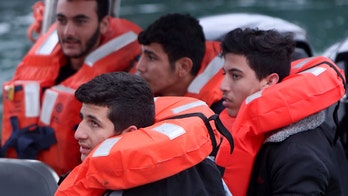The signing of an "aggression" pact between Russia and North Korea has raised concerns about the global implications, particularly in light of North Korea's recent missile launch and the escalating tensions between the Koreas. Lt. Gen. Keith Kellogg, a Fox News contributor, analyzes the significance of the pact and its potential impact.
By Lt. Gen. Keith Kellogg
The recent summit between Russian President Vladimir Putin and North Korean leader Kim Jong-Un has garnered significant attention, with the two nations signing an "aggression" pact that strengthens their military and economic ties. This pact has sparked concerns about its global implications, particularly in light of North Korea's recent missile launch and the escalating tensions between the Koreas.

Russia-North Korea Pact: A Strategic Alliance and Its Global Implications
On Wednesday, South Korea's military reported that its northern neighbors had launched a suspected solid-fueled hypersonic missile that exploded mid-flight. The missile was launched around 5:30 a.m. and traveled off North Korea's east coast before detonating. The Joint Chiefs of Staff stated that the engine fault likely caused the explosion, resulting in more smoke than usual.
The missile test comes amid escalating tensions between the Koreas, who have been engaging in Cold War-style psychological warfare tactics, including balloon launches and loudspeaker broadcasts. South Korea has condemned North Korea's balloon launches, which have carried trash and propaganda across the border, forcing the suspension of takeoffs and landings at Incheon International Airport.

Russia-North Korea Pact: A Strategic Alliance and Its Global Implications
North Korea has stated that the balloon launches are in response to South Korea's use of balloons carrying political leaflets across the North. In response, South Korea has resumed loudspeaker broadcasts along the border, the first time in years. The North Korean military has threatened to retaliate with "powerful military actions" if the broadcasts continue.
In response to the evolving nuclear threat posed by North Korea, South Korea and the US have conducted joint drills involving 30 advanced fighter jets. The aircraft carrier USS Theodore Roosevelt arrived in South Korea on Saturday, while South Korean President Yoon Suk Yeol visited the vessel on Tuesday, emphasizing the strength of the US-South Korea alliance.

Russia-North Korea Pact: A Strategic Alliance and Its Global Implications
South Korean officials have stated that the drills aim to enhance the three countries' ability to counter North Korea's nuclear threats, particularly in light of the strengthening military partnership between North Korea and Russia. The summit between Putin and Kim has raised concerns about the potential for increased Russian support for North Korea's nuclear program.
The Russia-North Korea pact and North Korea's missile launch have raised concerns about the global implications. It underscores the evolving nature of security dynamics in the region and the potential for further nuclear proliferation. The international community, including the United Nations, has condemned North Korea's missile tests as violations of UN resolutions.

Russia-North Korea Pact: A Strategic Alliance and Its Global Implications
The signing of the Russia-North Korea pact and North Korea's missile launch have heightened tensions in the region and raised concerns about the global implications. The evolving dynamics require careful monitoring and diplomatic efforts to prevent further escalation. The international community must continue to work towards a peaceful resolution of the Korean Peninsula conflict and prevent the further proliferation of nuclear weapons.










